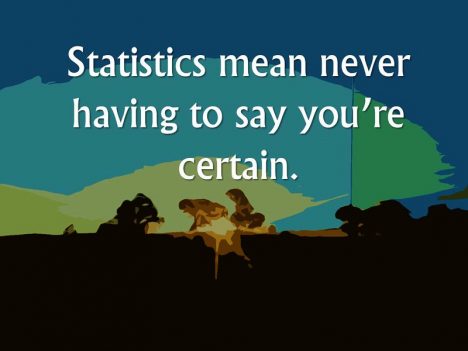WE ADVISE YOU TO BE WARY OF ADVICE

If you believe in the theory of Supply and Demand – and really who doesn’t – you already know that the more plentiful a commodity is, the cheaper it becomes.
For instance, gold is a commodity. What makes it valuable, is that there isn’t that much of it. What makes gold even more valuable is when an artisan takes the raw material and fashions it into a beautiful ring or necklace. It is no longer a commodity, it is a work of art.
Advice is liked that. Everybody has an opinion and few are shy about sharing it. That’s why people warn you that advice is cheap, which of course is its own kind of advice.
What transforms advice from a commodity to something of value is when the person giving advice to you knows what he or she is talking about and is kind enough to share it with you.
For example:
DON’T BELIEVE any advice that relies on statistics to make its point. Common sense is almost always better than statistics. It’s almost impossible to know all the details about how the data was gathered, who gathered it, and what role personal prejudice and motive played in putting together the conclusions.
On the other hand, in the rare incidents in which common sense turns out to be not correct, you need to be willing to look at the other alternatives.
MY BUSINESS PARTNER once advised me, during a tense time when a lot of money was coming in and a lot of money was going out to pay bills, that it wasn’t really about cash – it was about “cash flow.” This was of course complete nonsense – 90 percent wishful thinking and 10 percent blind hope – but we still laugh about it today.
THE TRUTHFULLNESS OF ADVICE doesn’t necessarily make it valuable. I had a fellow vet give me a street-wise tip about dealing with the Veterans Administration. When you are trying to score some drugs to get you through the night, never tell them “you keep thinking about killing people.” That will get you in deep shit, he warned.
“Tell them, you dream about killing people. You can’t help what you dream, man.”
I thought it was good advice if I wanted free drugs. Sadly, I did not.
NEVER TRUST anybody who says “trust me.” In my experience, the words “trust me,” translates in real life to “I’m going to tell you a lie.” If you don’t already trust him, certainly don’t trust him after he tells you to trust him.
This manifests itself in a variety of ways. When Google promotes itself with the term, “Do No Evil,” watch your back. What they mean is “do no evil,” unless there is a good reason to do so. Other manifestations of the same sentiment are auto dealers trying to convince you to buy the undercoating; realtors urging you to come down $10,000 on your price, costing them maybe $300 in commission; and those Nigerian princes, who always need some fast cash.
NEVER TAKE anything you read in the news or see on TV at face value. Across the political and aesthetic spectrum, news reporters and editors have prejudices, hidden agendas and sometimes weird perspectives. And as in all occupations from college professors to plumbers, incompetence is rampant.
That means, if you read a story in the newspaper and you don’t understand exactly what happened, there’s a good chance that neither did the reporter.
You may think I am being a skeptic. You would be correct, and I think you should be too.
At least, that’s my advice.
Do you have an opinion on the subject? Contact me at george@georgeleecunningham.com and let me know. Meanwhile, you can always subscribe and get an email reminder of blog postings. Your name will not be shared and you may cancel at any time.
